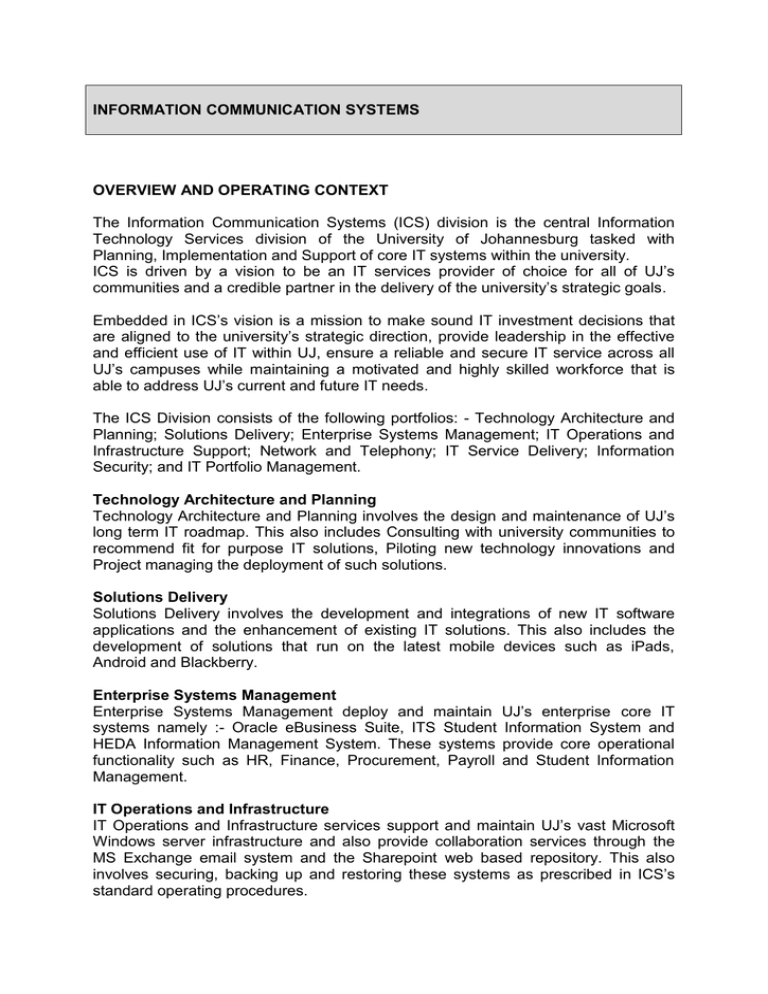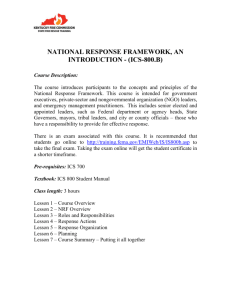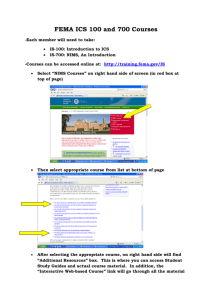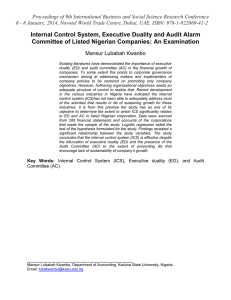ICS Annual report 2012 - University of Johannesburg
advertisement

INFORMATION COMMUNICATION SYSTEMS OVERVIEW AND OPERATING CONTEXT The Information Communication Systems (ICS) division is the central Information Technology Services division of the University of Johannesburg tasked with Planning, Implementation and Support of core IT systems within the university. ICS is driven by a vision to be an IT services provider of choice for all of UJ’s communities and a credible partner in the delivery of the university’s strategic goals. Embedded in ICS’s vision is a mission to make sound IT investment decisions that are aligned to the university’s strategic direction, provide leadership in the effective and efficient use of IT within UJ, ensure a reliable and secure IT service across all UJ’s campuses while maintaining a motivated and highly skilled workforce that is able to address UJ’s current and future IT needs. The ICS Division consists of the following portfolios: - Technology Architecture and Planning; Solutions Delivery; Enterprise Systems Management; IT Operations and Infrastructure Support; Network and Telephony; IT Service Delivery; Information Security; and IT Portfolio Management. Technology Architecture and Planning Technology Architecture and Planning involves the design and maintenance of UJ’s long term IT roadmap. This also includes Consulting with university communities to recommend fit for purpose IT solutions, Piloting new technology innovations and Project managing the deployment of such solutions. Solutions Delivery Solutions Delivery involves the development and integrations of new IT software applications and the enhancement of existing IT solutions. This also includes the development of solutions that run on the latest mobile devices such as iPads, Android and Blackberry. Enterprise Systems Management Enterprise Systems Management deploy and maintain systems namely :- Oracle eBusiness Suite, ITS Student HEDA Information Management System. These systems functionality such as HR, Finance, Procurement, Payroll Management. UJ’s enterprise core IT Information System and provide core operational and Student Information IT Operations and Infrastructure IT Operations and Infrastructure services support and maintain UJ’s vast Microsoft Windows server infrastructure and also provide collaboration services through the MS Exchange email system and the Sharepoint web based repository. This also involves securing, backing up and restoring these systems as prescribed in ICS’s standard operating procedures. Network and Telephony Network and Telephony services maintain the IT network backbone that criss-crosses across UJ’s four campuses providing seamless connectivity to every inhabitant of the university. This also involves the provision of WiFi connectivity to the Libraries, Lecture venues, Student residences and selected Open areas of the university. Network and Telephony is also responsible for managing the Telephone Management System which routes in access of 1.2 million calls per month. IT Service Delivery IT Service Delivery has four service arms namely:- Help Desk, Desktop Support, Computer Labs and Audio Visual Unit. The Help Desk provides the interface and a single point of contact between ICS and the rest of its users. Desktop Support is tasked with supporting and maintaining user laptop and desktop systems. Computer Labs provides desktop support for student computing. The Audio Visual Unit installs and services teaching aids such as overhead projectors, motorised screens and lecturer microphones Information Security Information Security mitigates risks involved in using IT by raising awareness on IT related risks, defining relevant policies to secure information assets, conducting assurance on the adoption of such policies and responding to audit findings that relate to information security IT Portfolio Management IT Portfolio Management handles all ICS administrative tasks on behalf of the Executive Director; this includes the management of software licences, provision of secretarial services, managing the ICS asset register. FOCUS AND TARGETS Three strategic goals are applicable to the ICS portfolio namely:- Sustained excellence in service delivery, Equivalence of all campuses and Resources that enable UJ’s fitness for purpose. To position itself to deliver on the above strategic thrusts ICS developed and adopted a new organizational structure based on best practice IT principles. Management job descriptions and key performance areas were revised and performance contracts modified to align with the new organization structure. PERFORMANCE Following are key achievements attained through the refocusing of ICS into a service oriented division:Technology Architecture and Planning The network architecture was simplified to allow for quick troubleshooting and ease of maintenance, this has increased network availability to 99%. EduRoam was implemented allowing UJ personnel free and seamless WiFi access when visiting participating universities in South Africa. Solutions Delivery The introduction of a Business Analyst role has allowed for proper analysis and capturing of user requirements enabling delivery of fit-for-purpose systems. The UJ MobiSite built in collaborations with an external vendor (ITS) has greatly simplified the handling of online applications making UJ a first in this regard. The Marks Administration system (MAMS) was delivered to the delight of the academic community Enterprise Systems The 98% systems availability target was exceeded on all core systems (Oracle, ITS, HEDA) making interruptions due to system unavailability non-existent. The newly updated Oracle Release 12 system went live in October with added functionality, improved performance and advanced security features. Network and Telephony To achieve equivalence; access to resources must be provided equally to all 4 campuses. To address a network connectivity problem that had been prevalent at the Soweto Campus for a long time because on an unreliable connection going via Baragwanath hospital, a bypass was commissioned which has returned stability of the Soweto campus connection to 100%. The greatest success for 2012 has however been the rollout of WiFi covering all 4 libraries, 26% of all lecture venues, communal areas in all student residences and selected open areas in all campuses. WiFi rollout has enabled UJ’s ubiquitous connectivity strategy and established a foundation for the implementation of eLearning services. The availability of WiFi connectivity also implies less congestion at the computer labs as students are now able to connect their WiFi enabled devices from the many hotspot areas across UJ. The extension of the Telephone Management System allowing the call centre to move from 8 seats to 50 seats and the implementation of PC based phones contributed immensely to the success of the adopted no walk-ins strategy. IT Operations and Infrastructure 100% availability was achieved for all collaboration systems (Email, Calendar, Sharepoint) exceeding the 98% target. A virus free target was maintained on all critical systems. Response times to user issues were excellent. IT Service Delivery Weekly service review meetings were introduced to assess IT service delivery performance and to take immediate corrective actions where required, these are chaired by the Service Delivery manager and involve all ICS departmental heads. A maximum of two hour response time was achieved on all logged calls. Incidents not fully resolved and carried over have been managed down to an average of one a day for each of the 4 campuses resulting in improved user perceptions. Student computer labs have met the 98% availability targets. The transition of the printing service to Konica Minolta was well managed with limited disruption. Information Security A Change Advisory Board was introduced to manage all system changes going into the production environment; this resulted in a disciplined approach to system changes and an improvement in system stability. Disaster recovery processes were adopted and successful tested for all critical systems. An email archiving solution was implemented which allows for a 5 year retention history of all UJ emails. A desktop archival solution was implemented which allows for automated backup of selected Desktop/Laptop files. Processes implemented have ensured a secure IT operating environment with 0% loss of critical data. Financial Management ICS has stayed well within its budget while achieving a major organizational restructuring which involved the addition of senior posts utilizing internal budget and not requiring additional funding for this exercise. The allocated Capital Expenditure budget was fully utilized with 99% of projects implemented within budget and on time. The operational budget was not exceeded. POLICY FRAMEWORK AND GOVERNANCE Policy and Legal Framework The following policies and regulations are relevant to the ICS environment Policy on Purchasing and Replacement of Computing Equipment; e-Communication Policy; e-Evidence Policy; email Legal Notice; Information Security Policy Protection of Personal Information Act (POPI) Promotion of Access to Information Act (PAIA) Governance Chapter Five of the King III code of good governance requires that the University of Johannesburg put in place an IT Governance Framework to address key management controls. A project has been undertaken to establish such a framework and to align ICS’s controls and practices with this framework. A draft IT Governance framework has been developed and is now going through a review process before adoption. The new ICS organizational structure has been aligned to the COBIT 5 IT governance principles of Plan, Build, Operate and Manage with each pillar having specific controls and measurable deliverables. ITIL principles have also been incorporated into ICS’s management and control practices resulting in the achievement of a stable and secure IT environment. The recently promulgated POPI and PAIA acts will require a review of IT systems and an extensive compliance exercise will need to be undertaken. RISKS AND MANAGEMENT OF RISKS ICT is an enabler of many of the University’s core processes, it is therefore imperative that Risk Management be an important part of ICS’s operations. Data Centres Following an extensive audit in 2011 the following risks mitigation measures were implemented within all the ICS data centres:- Access control with electronic logging, Clean power with battery/generator backup, Adequate cooling, Fire suppression system that is tested regularly. ICS’s Information Security department conducts regular independent data centre control reviews to ensure compliance. ICS continues to encourage all divisions and faculties of the university to move their IT systems to ICS’s more secure data centres. Application of software patches An audit report tagged some of the IT systems as not reflecting the latest software patches, this is because ICS only applies patches that are approved by the software vendor concerned. The recommended software patches were referred to the vendors concerned (Blackboard, ITS) for approval and will be applied in due course. A patch management process has been defined which will proactively deal with such issues. Change Management Changing and configuring of systems was tagged as inadequate on the eLearning environment (Edulink). A change management process used within ICS has been made available for implementation by the Academic Development and Support division. ICS will continue to mentor and support this division to ensure successful implementation and maturing of their change management processes. Review of activity logs Review of super user activity logs was tagged as inadequate on the Unix systems. An audit log review process is being implemented where all changes made by the Unix super user are matched to the records of the Change Advisory Board to verify change authorization, the logs will also be filed for future reference. Inability to recover critical systems While ICS’s disaster recovery processes are functioning well and are being tested regularly, an audit concern was expressed regarding the lack of a university wide business continuity plan. This issue has been taken up with the Chief Risk Officer and a project is in the process of being initiated from his office to address this audit finding, ICS will be a participant in this project. Password complexity Passwords were tagged as either simple enough to be guessed or were set not to expire on certain systems. The recommended changes have since been implemented to strengthen all system passwords. System vulnerabilities Database and SQL injection vulnerabilities were identified on supporting systems, these vulnerabilities have all either been closed per audit recommendation or the offending system has been switched off as it was used as a test system. Audit and Risk Log The Information Security Manager maintains the audit and risk log and constantly follows up to ensure that highlighted actions are carried out. A risk review committee comprised of ICS senior management sits on a monthly basis to review the IT risk log and to follow up on risk mitigations and audit actions. Filling of critical vacancies ICS was able to attract good talent and fill most of its critical vacancies. Of note is the appointment of Enterprise Systems manager, IT Portfolio manager and Business Analyst. A process has started to fill the Technology Planning and Architecture and Solution Delivery management positions. Retention continues to be a challenge as employees are lured by better salaries but ICS believes that the environment it is offering of excellence, growth and development will be one of its main attractions. CONCLUSION ICS has continued to deliver valuable IT services in 2012, this is confirmed by the admirable support it continues to receive from its stakeholders. Stability of the IT environment and service excellence is now the expected standard, innovation and strategic consulting to see IT adding value to the core business of teaching; learning and research are now the new targets. TARGETS AND WAY FORWARD As part of its refocusing, ICS adopted a five pillar ICT strategy (The Digital Campus) with the following goals:- Guaranteeing a Fast, Reliable and Secure data network - Providing ubiquitous connectivity to the community - Facilitating virtual student engagement - Proving a searchable online institutional repository - Delivering IT Service excellence The Division is on a journey towards the realization of the above goals. WiFi rollout to the lecture venues has set the scene for a great mobile learning revolution in the UJ teaching and learning arena. ICS is working with internal and external stakeholders towards the introduction of technology assisted learning. Key to this initiative is extending connectivity to outside the borders of the university, making it easy for student to acquire mobile devices, prescribing of paid and open source eTextbooks and the integration of open online courseware (Moocs) and social media as part of a blended learning experience. A mobile systems development capability is required to support the above endeavours, ICS is therefore investing in people and skills to build this capability. ICS continues to invest in ways and means of making the work environment a fun place to be with the aim of retaining current talent and attracting skilled new comers.




